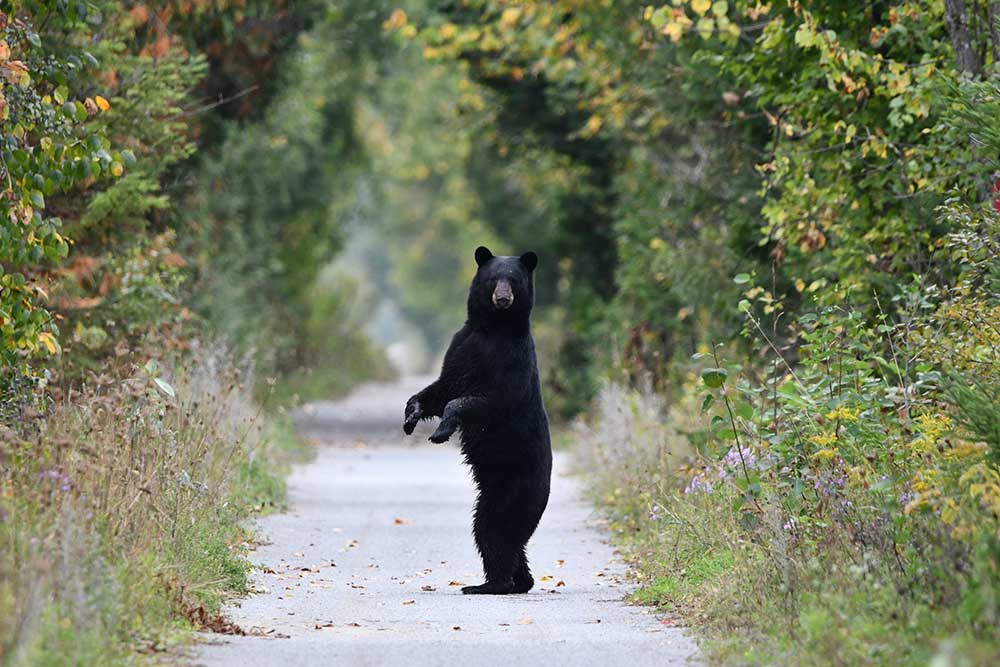NPS Director Chuck Sams allegedly violated his agency’s “protective mandate” for wildlife by allowing an eagle kill in Valles Caldera National Preserve/Patrick Cone file
National Park Service Director Chuck Sams violated his agency’s “protective mandate” for wildlife when he allowed the Jemez Pueblo to kill a bald or golden eagle inside Valles Caldera National Preserve last fall, according to a number of retired Park Service managers and wildlife biologists.
That allegation was contained Friday in a letter sent to Interior Secretary Deb Haaland urging her to take “immediate steps to ensure that the recent unlawful event at Valles Caldera does not stand nor recur in any other unit of our National Park System.”
“On October 18, 2023, Director Chuck Sams violated the protective mandate of the National Park Service. He did so by signing a Finding of No Significant Impact for NPS approval of Jemez Pueblo members to take, kill, and remove park wildlife (a bald or golden eagle) from Valles Caldera National Preserve, New Mexico,” the letter’s opening reads. “Sams’ decision has no precedent in the history of the National Park System and significantly weakens the fundamental underpinnings of the Organic Act, the National Environmental Policy Act, and subsequent laws.
“It should be noted that no previous director has ever made such a decision. This is the first, and thus far, the only time,” it continues. “But it sets a precedent that succeeding administrations can and will cite, possibly resulting in future permitting of wildlife take in the parks. Significantly, the NPS acted unilaterally with no public review or consultation with other tribes. The environmental assessment appears as though it was veiled from the public until the decision was made.”
The director’s decision, made just five weeks after the pueblo made the request, appears to conflict with Park Service regulations that prohibit the taking of wildlife. They specifically block the “use, or possession of fish, wildlife, or plants for ceremonial or religious purposes, except for the gathering and removal of plants or plant parts by enrolled members of an Indian tribe in accordance with 36 CfR § 2.6, or where specifically authorized by federal statutory law, treaty…”
According to the National Park Service Management Policies of 2006, a compendium of directives for superintendents, superintendents are allowed to “designate certain fruits, berries, nuts, or unoccupied seashells that may be gathered by hand for personal use or consumption if it will not adversely affect park wildlife, the reproductive potential of a plant species, or otherwise adversely affect park resources.”
Sams has not replied to previous requests from the Traveler to explain his decision, and an email Friday to Park Service headquarters in Washington seeking comment from the director was not immediately answered.
The letter to Haaland was signed by Deborah Bird, retired superintendent at Lake Roosevelt National Recreation Area; Frank Buono, retired deputy superintendent from Joshua Tree National Park; Gary Davis, a retired chief ocean scientist for the Park Service; Mary Foley, Ph.D., a retired regional chief scientist for the agency; Elizabeth Johnson, a retired deputy association Park Service director for Natural Resource Stewardship and Science; Bob Krumenaker, retired superintendent from Big Bend National Park and the Rio Grande Wild and Science River; Elaine Leslie, Ph.D., retired chief for the Park Service’s Biological Resources Division; Kent H. Redford Ph.D, of Archipelago Consulting in Portland, Maine; Raymond Skiles, retired wildlife biologist and wilderness coordinator from Big Bend; Douglas Smith, retired senior wildlife biologist at Yellowstone National Park; and Richard Smith, retired associate regional director for Resources Management in the Park Service’s Southwest Regional Office.
The letter told Haaland that, “[A]ny treaty rights for tribes to take eagles, the Supreme Court ruled in 1986, were supplanted by the [Bold and Golden Eagle Protection Act]. Except where specifically and explicitly provided for in a park enabling act, requests by Indian tribes, or others, to take eagles, living or dead, is in clear violation of NPS rules at 36 CFR 2.1 unless a legislative remedy to this matter is enacted.”
It added that, “[S]hould the Secretary or the Director wish to alter these protective mandates, it is to Congress they must turn to address the broad public policy considerations involved here. These decisions cannot be left in the hands of political appointees of any Administration.”
Former National Park Service Director Jon Jarvis in 2010 voiced opposition to the longstanding regulations prohibiting most consumptive harvesting in parks, which had the effect of prohibiting tribal members from collecting ramps, a type of wild onion, from Great Smoky Mountains National Park, generating considerable controversy as NPS directors do not have the discretionary authority to ignore federal regulations. That incident led the Park Service to review the ban, “and tribal perspectives were sought concerning how the regulation might be revised to permit park superintendents and Indian tribes to enter into agreements to gather plants and minerals for traditional uses,” said David Barna, at the time the agency’s chief spokesman.
The resulting regulation authorized “the National Park Service to enter into agreements with federally recognized Indian tribes to allow for the gathering and removal of plants or plant parts from National Park System areas for traditional purposes.” It did not authorize the taking of wildlife under any circumstances.
An issue with the taking of eagles from Valles Caldera is whether treaty rights the pueblo holds at the preserve allows for such takings. Frank Buono, who has worked in almost every aspect of national parks for almost 30 years, as a backcountry and law enforcement ranger, interpreter, fee collector, volunteer, and retired as deputy superintendent of Joshua Tree National Park, told the Traveler in November that while the Code for Federal Regulations “contains an exception for existing Federal law or treaty rights. … Jemez Pueblo has no treaty right to take eagles in Valles Caldera or the adjacent Bandelier National Monument.”
While “numerous Native American tribes and pueblos” have connections with Valles Caldera, and some “do not support ceremonial take of eagles,” it was not clear from the environmental assessment prepared on the request or the Finding Of No Significant Impact signed by Sams whether the Park Service consulted with other tribes and pueblos on this request.
In his approval of the permit, Sams said the public was not invited to comment on the matter “because of the limited window of time between application submittal and the start of the ceremonial period within which the proposed eagle take would occur.”





